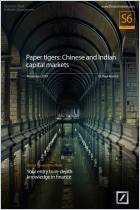Зарегистрируйтесь на getAbstract, чтобы получить доступ к этому краткому изложению.

Зарегистрируйтесь на getAbstract, чтобы получить доступ к этому краткому изложению.
Mariassunta Giannetti
On the Fortunes of Stock Exchanges and Their Reversals
Evidence from Foreign Listings
ECB, 2013
Что внутри?
Companies follow the money – and, surprisingly, stricter regulation.
Recommendation
As capital flows around the globe, it has become simpler for investors to buy securities in almost any of the world’s stock exchanges. This raises the question of why companies continue to seek secondary listings outside their home countries. Finance professors Nuno Fernandes and Mariassunta Giannetti undertook a broad study that offers some new insights into why and where firms cross-list their shares, and what roles governance rules and investor protection play in those choices. Their paper is rigorously academic in tone, and getAbstract recommends it to executives, regulators and policy makers with an advanced technical interest in the topic.
Summary
About the Author
Nuno Fernandes is a professor of finance at the International Institute for Management Development in Lausanne, Switzerland. Mariassunta Giannetti is a professor of finance at the Stockholm School of Economics.




















Comment on this summary